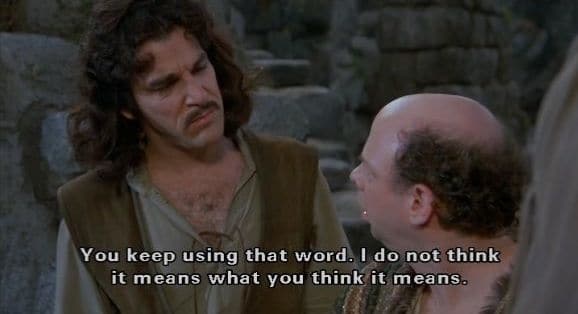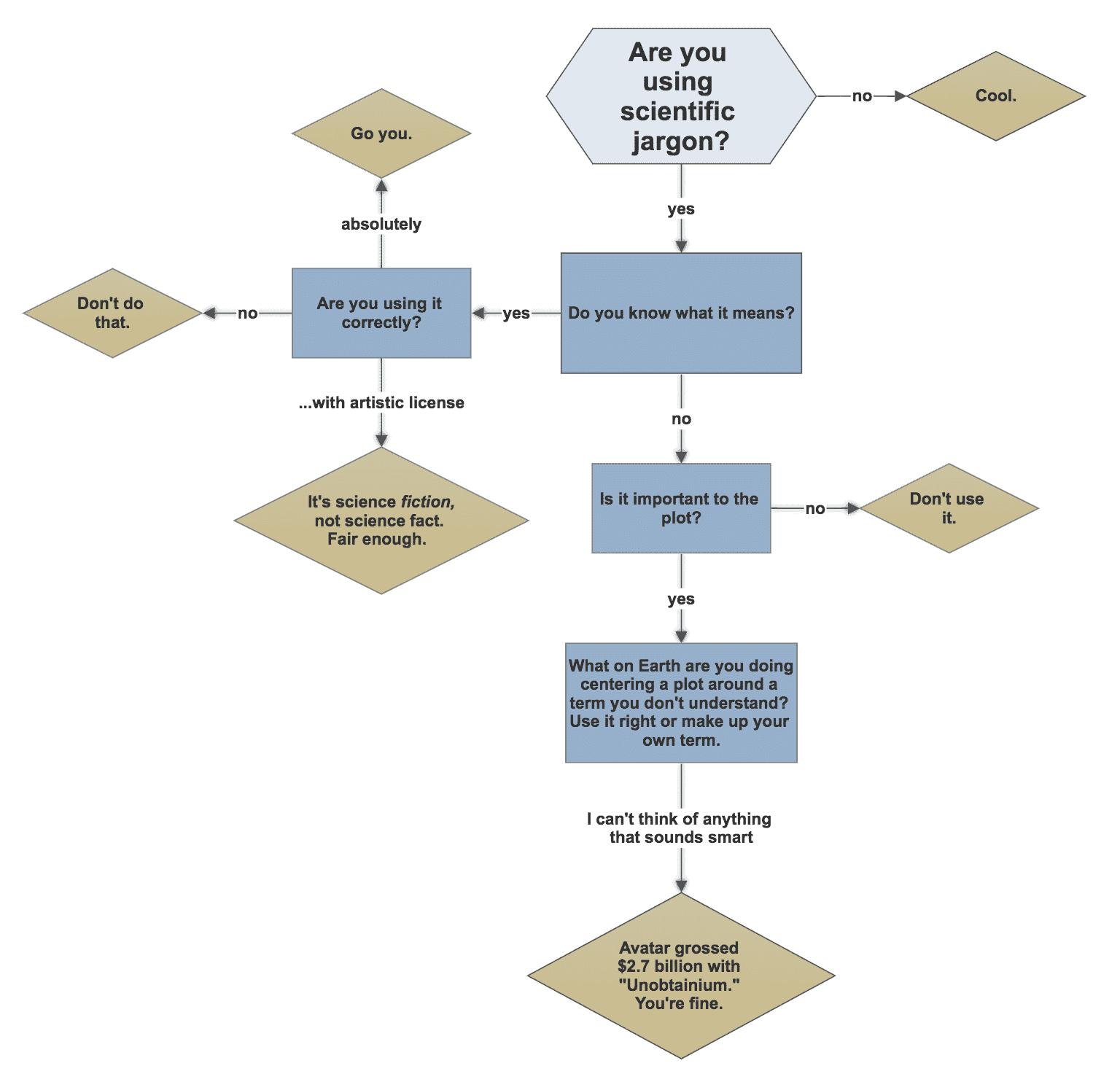
When it comes to movies, technobabble is when a character opens their mouth and lets out a stream of science words without ever going on to explain any of them, even though he or she is usually talking to a non-expert who almost certainly has no idea what those words mean.
Technobabble is treated as a necessary component of science fiction, but when it comes to science-fiction film and television, this is actually decidedly untrue. Books are another matter. In books, it’s not only a lot easier to work in explanations, but also, barring illustrations, technobabble is a key component of world-building. In a book, you have to describe to a reader how a thing looks, in a movie you can just show them the thing. When the latter is possible, there’s a lot to be said for that old mantra of “show don’t tell” — if a film is going to show a spacecraft that exceeds current scientific understanding, it is far better to just show it in all of its impossible glory without trying to describe the mechanism by which it works.
Here’s the thing about technobabble: If you do not know what the words mean, the statement means nothing. If you do know what the words mean, then you know that the statement is meaningless. So, when a movie or TV show has a character talking technobabble, a viewer is either being told absolutely nothing or feels decidedly like Inigo Montoya.

If a film is going to show us a fantastical thing, it doesn’t necessarily need to try to explain how that thing works. After all, not even experts know how it would truly work, at least not yet, because otherwise, it would be science fact and not science fiction. That’s the thing about the most blatant technobabble — you don’t even have to understand the jargon being used to know it’s not being used right.
Occasionally some small portion of technobabble actually ends up being an important plot point in such a way that the use of aforementioned technobabble is unavoidable. But this is the minority. The majority of technobabble comes up in filler dialogue or in situations where more generalized, nonspecific terminology would work just as well: “it’s broken,” “I fixed it,” “that’s dangerous,” “cut the green wire.”
One of the most consistent trends in technobabble is that in a string of science words, there’s usually one that’s not completely off-base—but it’s in seeking that truly jargon-y polysyllabic mouthfeel that technobabble tends to shoot itself in the foot.
Now, The Core has been called “the worst physics movie ever” by at least one source, but to address the point I’m getting at, we just need to look at one line uttered by supposed geophysicist Dr. Josh Keyes. At one point in the film, he claims that the Earth’s core makes an “electromagnetic field.” Issue is, electromagnetic is not synonymous with magnetic, which is the kind of field our planet’s core actually does make. Three syllables gained, all credibility lost.
To look at an example from a film that’s not considered an affront to science but still displays this same tendency, let’s turn to Alien. At one point Ash describes the alien’s blood as a “molecular acid.” All acids are molecular acids, because all acids are composed of molecules. Everything is molecules. No one who actually understands what molecular means and is comfortable using it in a sentence would ever use the term “molecular acid.” They would just say “acid,” because it’s the same damn thing.
Also, generally speaking, specialists are cognizant of the fact that those outside their field are not familiar with their particular set of terminology and at the very least try to modify their vocabulary accordingly when trying to explain something or get a point across to non-specialists. I can’t even count the number of times I have encountered scenes which use the following formula:
Non-Expert: [asks for help]
Expert: *Technobabble*
Non-Expert: In English, please.
Expert: [cuts to the chase]
Nine times out of ten, if not more, absolutely nothing would be lost from the narrative by doing the following:
Non-Expert: [asks for help]
Expert: *Technobabble*
Non-Expert: In English, please.Expert: [cuts to the chase]
Just think of this exchange in The Avengers:
Steve: If that thing gets up to speed you’ll get shredded!
Tony: That standard control unit can reverse the polarity long enough to disengage maglev, and that should—
Steve: Speak English!
Tony: See that red lever?
If you cut out the middle bit, you lose the funny banter! some of you might be thinking. The thing is, it’s the same joke. Over and over and over again, and it’s only funny maybe the first three times you hear it.
Overly convoluted and dense jargon-heavy science speak reeks of bullshit — and this is true even in actual science. When you’re reading a scientific paper and suddenly come across a particular sentence or section that seems particularly oblique, it sets off a red flag. Often times such impenetrable prose is used as a diversion tactic, attempting to obscure issues like questionable methodological decisions or concerns only realized post-hoc.
This is not to say that films should entirely avoid science jargon or that artistic license is always bad. It’s science fiction, after all — if you don’t want to encounter even the slightest liberties taken from scientific fact, you should really just go read a textbook. But when a film doesn’t want to pay any attention at all to scientific reality, it would really be better off not trying to create that illusion with a bunch of real science words. If you’re going to use real science terminology, do your research, and if you’re not, just embrace that.
And just in case any of you out there are working on sci-fi scripts, I even made a handy flowchart:

Related Topics: Opinions, Science Fiction, Screenwriting

